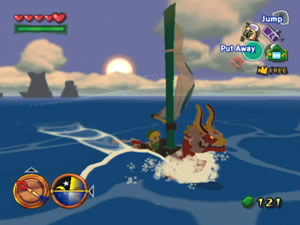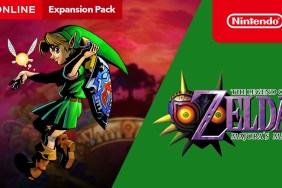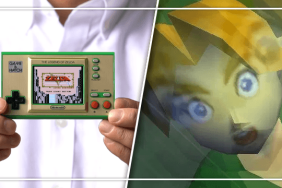Come sail away with me…
In a world filled with water stretching out as far as the eye can see, a legend
from a bygone age is passed down from generation to generation. It’s the story
of a young boy, garbed in green, who saved the Kingdom of Hyrule – the one called
the Hero of Time.
More than a thousand years later, another Link lives on the island of Outset with his Grandma and sister, Aryll. On his birthday, Link follows his people’s tradition and dons a familiar green outfit in hopes of being as courageous as the one spoken of in legend.
The
Legend of Zelda: The Wind Waker certainly has a lot to live up to, as the
series is perhaps the most cherished of all Nintendo franchises. Gladly, it
does not disappoint. While the game has some minor pacing and audio problems,
the brave new art style, tightly evolved gameplay and humorous story takes the
famous series in a bright, new direction.
Just to clear it up – Wind Waker focuses on a Link that isn’t
Link. While that might sound like a “Raiden” is being pulled on us, Wind
Waker‘s story does satisfy and isn’t a retread of an old plot. Rather, it’s
your duty to track down a kidnapped girl with the help of some odd pirates,
though it takes plenty of twists and turns along the way.
Wind Waker actually goes for humor a bit more than the past Zelda
games. Some of the slapstick falls short (smashing Link into a wall is funny
only the first time), but there are some genuinely funny moments and some memorable
dialogue. At any rate, Wind Waker never quite hits the epic grandeur
of Ocarina of Time, nor does
it tug on the heartstrings in nearly the same way as the girl with the sick
father in Majora’s
Mask. But the lighter story does fit the game well.
Thankfully, this new Link still knows how to fight. The combat continues to
build upon the lock-on targeting first introduced in Ocarina. Parrying,
dodging, rolling and spinning are handled seamlessly with the GC controller,
which essentially works just like the N64 controller. Fighting against multiple
enemies and the general timing of combat feels right.
Unfortunately, it’s hard not to notice the annoying pauses in the middle of combat. When you land a hit, the game momentarily holds the frame for a second. I think this was done on purpose. Why? If Link faces off against multiple enemies, say an entire swarm of bats, the number of held frames greatly adds up while Link is swinging to and fro.
In addition to the trusty sword, many classic items are back, from the hookshot
and hammer to the iron boots and mirror shield. The boomerang, in first-person
perspective, can now swiftly target up to five items at once. There aren’t many
new additions, but a few are worth mentioning. A grappling hook complements
the hookshot; with the hook, you can swing from branches and steal items from
enemies. Link can also use a giant leaf as both a parachute and a fan.
At one point in his quest, Link receives a gift from an odd fellow named Tingle,
who was first introduced in Majora’s Mask. His gift, the Tingle Tuner,
allows someone with a Gamecube/GBA connector to link up and interact simultaneously
with the GBA game Link’s Adventure. While it isn’t necessary to use this
function to complete Wind Waker, the GBA interaction is clever and is
especially useful to younger players.
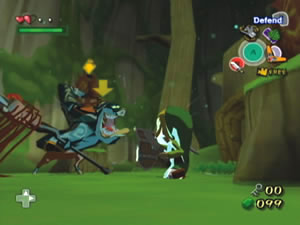 Ever
Ever
since he first picked up a recorder in his original NES adventure, Link has
been something of an amateur musician. Wind Waker continues this tradition
by giving him a conductor’s wand. The wand is never as natural as the ocarina,
perhaps because the ocarina controls corresponded to actual notes whereas the
wand involves moving the C-stick to preset timed rhythms.
By waving the wind wand, Link can change the direction of the wind, which
becomes very important as he sails the vast, treacherous seas in his talking
boat, the King of Red Lion. There are 49 spaces in the sea grid, and in order
to make a log of each space, you must find a man-fish swimming near the shore
of each space’s principle island. Prepare to spend an inordinate amount of time
feeding fish
At its best, the sailing broadens the scope of the adventure by letting you
roam about the vast ocean, similar in a sense to the enormous Hyrule Field from
Ocarina. At its worst, it makes you feel like your sailing through Waterworld.
To cut down the tediousness of sailing, the game eventually grants the ability
to warp to different areas of the map by calling forth cyclones via the wind
wand. Not that sailing is bad, but if I had a choice between a boat in a near
endless sea or riding a horse across a country plain, I’d choose the horse.
The wind wand can also allow you to conduct music in key areas and take control
of a secondary sage character. There are seven sages in the Zelda world
– in this game, there are only two sages with two dungeons connected to them.
With Link as the conductor and each sage with their own musical instrument,
it’s sort of a small band. Was there supposed to be more? Oh well, The
Police were only three and they rule.
Wind Waker has received a great deal of flak from fans for its cel-shaded
graphics, due in part to a more mature ‘screenshot”
released by Nintendo before the Gamecube even came out. While these disagreements
will always exist, I think it’s safe to say that the cel-shading works perfectly
with the story.
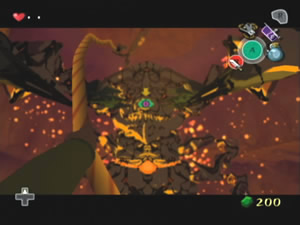 The
The
characters move and emote with astonishing fluidity. The environments really
capture the tone; the best moments are when the sun is just rising in the distance
or while fighting in a thunderstorm, when the visuals take on a unique 2D/3D
mesh. When an enemy is killed, it dissolves in a poof of Chinese whirly-whirl
clouds. I never got tired of that. Flame and lighting effects are terrific and
the huge bosses look simply amazing. Regardless of whether or not you think
the new style fits the series, it’s plain to see that Wind Waker is a
graphical marvel.
The music has more of a folklorish feel, but none of it stacks up against
previous Zelda games, though it’s still above average. The new compositions
begin with the hints of something grand and moving, but then peter out to fairly
generic melodies that lack soul.
There are no voices in the game, only little cries, murmurs and gibberish
to go with the text. Considering this is a monstrous next-gen undertaking, I
wish they just went the full distance and delivered voiced supporting characters.
I understand the arguments against voice acting and I know I’m opening the
floodgates, but decisions such as this should be made in the best interest of
the story. In my opinion, the canned sounds at the start of a text block just
don’t hit the mark, and after a while the text scrolling gets a little tiresome.
Wind Waker plays like an easier Ocarina. While the length is
right at about 20 hours, the dungeons get a bit scarce in the later areas. During
the last leg of the game, the pacing changes into an extended item search. In
compensation, these items have mini-dungeons attached to them, involving gauntlets
of enemies to fight through. And thankfully, the game does include a second
slightly altered quest.
From its graphics to its gameplay, Wind Waker continues the excellent
tradition of the Zelda series. It is beautifully stylized and the gameplay
is finely tuned. The flow of the game isn’t the traditional episodic rhythm
of dungeon/town/dungeon, which is a welcome departure, but the drawn-out exploration
near the end is a bit much. Score another winner for Link.
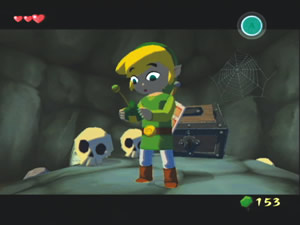
-
Beautiful, unique animated style
-
Finely-tuned combat
-
Good story
-
Clever Tingle Tuner
-
Combat action pauses
-
Not really revolutionary
-
Mediocre audio
